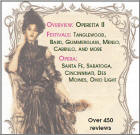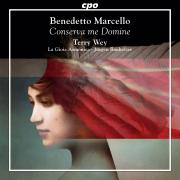Texte paru dans: / Appeared in: |
|
|
Outil de traduction ~ (Très approximatif) |
|
|
Reviewer: Charles
Brewer
The Italian paraphrases of
Psalms 1-50 from the Estro Poetico-armonico by Benedetto Marcello
(1686-1739), were perhaps his most famous works in the 18th Century, and
were even adapted by Charles Avison to English texts (J/F 2016). The musical
style of Marcello’s psalms has much in common with the Italian cantata, an
intermixed series of da capo arias, recitatives, and ariosos, generally
following the progression of the Italian paraphrase. The collection includes
pieces for different vocal combinations from solo to four parts, with
continuo and sometimes an instrumental obligato. Wey performs Psalms 8 and
15 (with obligato cello), but there are two minor problems. By interpreting
Psalm 8 as a solo work, the solotutti indications in the original print by
Marcello are not observed or even hinted at by altering the continuo
support, but this is common in other recordings of the settings for single
voice. In Psalm 15, the Hebrew intonation “of the Germanic Jews” is omitted.
The recording of Psalm 15 by Rinat Shaham (ATMA) is much more vivid, with
the cello part much less covered by the continuo than on this new release,
and it does include the Hebrew intonation.
The other works on this
recording incorporate an unusual obligato instrument, the salterio, a type
of hammer dulcimer, played with great skill by Margit Uebellacker. In
Marcello’s Sonata 3 from his Opus 2, she easily substitutes for the original
recorder solo. The remaining selections contain original parts for the
salterio and demonstrate its popularity in Italy in the mid-18th Century.
The Sonata a due by Melchiorre Chiesa (c1770) is an original work for
salterio solo and continuo.
Padre Giambattista Martini
(c1706-84), a teacher of JC Bach, wrote an unusual setting of an excerpt
from St Augustine’s commentary on Psalm 63, which was a reading for the
second Nocturn for Matins on Good Friday, one of the Tenebrae services.
Martini actually combines solos for both the salterio and harpsichord with
the solo alto; and the music, which is rather joyful, most likely reflects
the emphasis by Augustine on the victory of the resurrection. The indication
that the setting of the Lamentazione Seconda by Antonio Sacchini (1730-86)
was “for Holy Thursday” while the text is liturgically associated with Good
Friday may represent a performance tradition of the Neapolitan nuns who
owned this manuscript. It is likely that, as with François Couperin’s
Tenebrae lessons, the Good Friday service was actually held on the previous
day’s afternoon rather than in the middle of the night. As with the Martini,
some passages in Sacchini’s music, which is set for alto, salterio, and
continuo, are much more lively than might be expected, though the
traditional final refrain for the Tenebrae Lamentations, “Jerusalem, turn to
the Lord, your God”, introduces a more somber tone. This is a very good introduction to unusual sacred repertoire from 18th Century Italy. It demonstrates that there is still much interesting music to discover. | |
|
Support us financially by purchasing this disc from eiher one of these
suppliers. Un achat via l'un ou l'autre des fournisseurs proposés contribue à défrayer les coûts d'exploitation |
|
|
|
|
|
Cliquez l'un ou l'autre
bouton pour découvrir bien d'autres critiques de CD |
|




